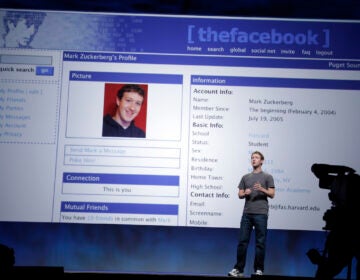When and why workers are ‘cyberloafing’ on the job
Whether they're working in the office or remotely, many people spend time on their phones or online for non-work activities. But is it necessarily a bad thing?
Listen 6:42
A woman is happily using her cell phone while working remotely at home (Big Stock/ViShark).
This story is from The Pulse, a weekly health and science podcast.
Find it on Apple Podcasts, Spotify, or wherever you get your podcasts.
One of the big worries over remote work is that employees will slack off when they’re not in an office and do other stuff — play video games, watch television, or scroll around aimlessly on the internet as the hours tick by.
Researchers have a name for that behavior: cyberloafing. It’s when people spend time online, on their phones, or use other electronic devices during working hours for non-work-related activities.
It’s been traditionally labeled as a counterproductive work behavior, a waste of time leading to loss in productivity and profitability.
But studies in recent years find that cyberloafing has less to do with our physical workspace, and more to do with boredom, societal norms, and stressful situations with colleagues on the job.
Experts say new research has better informed guidance on how to reduce cyberloafing among employees, and when to leave it alone. Shani Pindek, an industry and organizational psychologist, said intervention should focus on the root causes of cyberloafing instead of the behavior itself.
“If you give your employees a good job with good tasks, they will cyberloaf to the extent that is needed, but they cyberloaf less in general. They’ll be more engaged,” she said. “They should be working on making the jobs more interesting and making it such that there is less abuse on the job.”
Cyberloafing costs organizations an estimated $85 billion a year, according to researchers at the University of Nevada.
Subscribe to The Pulse
In a 2018 report by Udemy, an online learning platform, about 62% of survey participants reported that they spend about an hour looking at their phones during the workday. One-third of millennials and Gen Z employees reported spending two hours or more doing the same.
Social media platforms accounted for some of that phone time, and 86% of respondents named Facebook as a work distraction.
Pindek, an assistant professor at the University of Haifa in Israel, said some workers may gravitate to these platforms and devices almost subconsciously.
“Sometimes I sort of realize I’ve been cyberloafing and I don’t even remember when that instant was when I switched,” she said.
Accessibility and job functions can also play a part in how often or how much someone spends cyberloafing, Pindek said. It will look different for someone who relies on a computer for most of their job and someone else who has more physical, non-technological duties.
“Nurses are the first subpopulation that told us, ‘Cyberloafing, what? It’s impossible. We’re just running from patient to patient,’” she said. “But even for nurses, not all nurses are equally busy. And in some cases, when the workload is slower, they will find themselves cyberloafing. So, it’s different occupations, but also just different workload levels within each occupation.”
Excessive cyberloafing might lead to poor performance or create additional stress for someone who behind on their tasks. But Pindek said when done in moderation, her research has shown that the behavior has benefits.
For example, it could serve as a small break needed to boost creativity and re-sharpen your focus.
“It’s a way to interrupt your stream of thought,” she said. “It’s an internal interruption, but this type of interruption also helps you spice it up, change in a way that changes the specific line of thought and be more creative.”
People who experienced boredom in their roles at work were also more likely to cyberloaf and make up for the lack of stimulation in their jobs, research shows.
“Boredom is a signal that something is suboptimal, something is not just right,” Pindek said. “And a change is welcome, you should change something. When you’re at work, there’s different things you can do about it, and the most immediate thing is cyberloaf.”
Research shows that cyberloafing may also serve as a coping mechanism for stress, frustration, anxiety, or workplace aggression and abuse.
Zhiqing Zhou, an industry and organizational psychologist and associate professor at Johns Hopkins University Bloomberg School of Public Health, said negative work-related experiences and exposure to stressful situations are common predictors and triggers of cyberloafing.
“If you want to really make people happy and productive and healthy in the workplace and want them to engage in the right behaviors, then we don’t want them to be exposed to those negative triggers that can trigger them to engage in unnecessary or extreme cyberloafing,” he said.
Zhou and Pindek teamed up to study one of those negative triggers. They specifically looked at email incivility, which can involve rudeness and passive aggressive tones in email communication, or excessive use of capital letters and exclamation points in negative ways.
It can also take on a more passive form, like when emails go completely ignored or are returned with the bare minimum information or response.
The researchers found that email incivility, specifically passive forms, led to increased negative emotions which then drove people to engage in cyberloafing.
“I might be frustrated, angry, or just upset,” Zhou said. “And then I might act on those negative emotions to detach myself, to distract myself.”
Zhou said the findings underscore the importance of addressing the triggers and precursors to cyberloafing, especially before it morphs into more serious forms of counterproductive work behavior like workplace deviance, which is a deliberate attempt to cause harm to an organization or employer.
“If we don’t address the root cause, people or employees sometimes might have to resort to more extreme behaviors to cope,” he said.
While cyberloafing might be viewed as a negative behavior, Pindek said it’s not something to feel shame or guilt over. More often than not, she said, workers make up for the time they spend cyberloafing.
“But we have gained something when we went to do things that were not work-related,” she said. “We were able to recoup some resources, we were able to relax if we were too stressed or get reengaged if we had gotten disengaged to begin with.”
As far as what businesses and companies can do to reduce cyberloafing, research shows that the best interventions can involve job enrichment opportunities to help someone feel more engaged and stimulated by their work, as well as training to limit workplace conflict and aggression.
WHYY is your source for fact-based, in-depth journalism and information. As a nonprofit organization, we rely on financial support from readers like you. Please give today.





